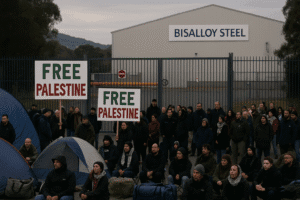Beyond the Picket Line: The Moral Siege on an Australian Steel Mill Exposed to Conflict
Approximately 100 protesters blockaded Bisalloy Steel’s Wollongong plant overnight, halting operations at Australia’s sole armored steel manufacturer. Organizers, including Palestinian activist Safaa Rayan, targeted the company over its exports to Israel, claiming its steel aids military actions in Gaza and constitutes complicity in civilian suffering.
Bisalloy countered that its products are legally exported with government approval, stressing they are defensive armor—not weapons—and represent a minor revenue share. The protest escalated amid global outcry over Gaza’s humanitarian crisis, underscored by Prime Minister Albanese stating Israel breaches international law.
Demonstrators like local Angela Scott cited images of starvation as motivation to act, framing the standoff as “people over profits.” The clash spotlights the dilemma facing manufacturers linked to conflict zones: where legal compliance ends and moral responsibility begins. This local action reflects deepening public demand for corporate accountability in global conflicts.

Beyond the Picket Line: The Moral Siege on an Australian Steel Mill Exposed to Conflict
The pre-dawn chill in Unanderra, Wollongong, was pierced not just by the coastal wind, but by the determined presence of around 100 protesters. For over 24 hours, they maintained a vigil, camping equipment and signs proclaiming “Free Palestine” blocking the gates of Bisalloy Steel. Their target: Australia’s sole manufacturer of specialized armoured steel plates. Their grievance: the belief that Bisalloy’s exports contribute to the Israeli military machine in Gaza. This recent escalation reveals the profound ethical dilemmas facing manufacturers entangled, however indirectly, in global conflicts.
The Heart of the Protest: Complicity in Crisis
Protesters like Palestinian organiser Safaa Rayan articulated a raw, visceral motivation. “We cannot see any employees,” she declared at the 7am shift change that never came, interpreting the halted operations as a victory. For Rayan and others, including co-organiser Jeremy Kerbil (previously arrested at the site), Bisalloy’s steel isn’t just a commodity; it’s potential armour for Israeli Defence Force (IDF) vehicles, making the company “complicit in the killing of civilians” and “aiding a genocide.”
Their demands were unequivocal: cease all trade with Israel. This sentiment resonated with attendees like Nicole Milinkovic from Campbelltown: “I don’t want to live in a world where this is normal.” Angela Scott, a local on her third protest, cited the “totally shocking” images of starvation in Gaza as her driving force.
Bisalloy’s Defence: Legality and Limited Scope
Bisalloy Steel, however, presents a starkly different narrative. Their repeated public statements, echoed again to the ABC, form a clear defence:
- Not Weapons: “Bisalloy does not manufacture steel products for the use in bullets, missiles or similar weapons.”
- Government Sanctioned: All exports are done “with the appropriate government approvals.”
- Minimal Exposure: CEO Rowan Melrose previously disclosed that Israeli sales constituted a minor fraction of revenue – between 0.6% and 1.9% over three years.
Their position hinges on operating within the legal framework and defining their product as defensive armour plating, distinct from offensive weaponry. The company declined to confirm current Israeli contracts or whether operations were deliberately halted due to the protest, maintaining a tight-lipped stance beyond their core messaging.
The Broader Canvas: A World Watching Gaza
This local protest didn’t occur in a vacuum. It unfolded against a backdrop of:
- Deepening Humanitarian Crisis: UN agencies warn of “mass starvation” in Gaza despite newly opened aid corridors.
- Mounting International Pressure: Prime Minister Anthony Albanese stated Israel was “quite clearly” breaching international law.
- Genocide Allegations: The International Court of Justice (ICJ) is considering South Africa’s case accusing Israel of genocide – allegations Israel vehemently denies.
This global context fuels the protesters’ urgency and moral conviction. They see Bisalloy not as a distant supplier, but as a tangible link in a chain they believe leads to Palestinian suffering.
The Enduring Dilemma: Ethics vs. Legality in the Supply Chain
The Bisalloy protests underscore a complex modern challenge:
- The Long Arm of Supply Chains: In an interconnected world, the products of peaceful industrial towns can end up in active conflict zones, raising questions of moral responsibility far beyond the factory gate.
- The Limits of Legality: Operating within government regulations and export controls provides a legal shield, but does it absolve a company of ethical scrutiny when the end-use contributes to documented humanitarian catastrophe?
- Citizen Action in a Globalized World: Faced with perceived government inaction, citizens increasingly target corporations they see as enablers, using direct action to disrupt operations and force accountability. The shift of Bisalloy’s AGM online last October and the current picket are direct results of this pressure.
- The Murky Middle Ground: Bisalloy’s insistence its steel is “not for weapons” but for “armour applications” highlights the grey area. Armour protects soldiers, enabling military operations. Does supplying this to a nation engaged in a highly controversial conflict constitute indirect participation?
Beyond the Gates: A Persistent Question
The Unanderra picket may have ended, but the questions it forces into the open remain unresolved. Can a company truly be neutral when its specialized products, however legally exported and however small the revenue share, are used by a military force under intense international censure? Does the responsibility end once government approvals are secured, or does it extend to considering the potential human cost downstream?
For protesters like Safaa Rayan, the answer is clear: “People over profits.” For Bisalloy, the path forward involves navigating an increasingly fraught landscape where legal compliance may no longer be sufficient to satisfy the ethical demands of its community and the weight of a watching world. This standoff at a Wollongong steel mill is a microcosm of the immense difficulty in reconciling global commerce with the harrowing realities of modern conflict. The silence of the shift change spoke volumes – the conversation, and the pressure, are far from over.
You must be logged in to post a comment.